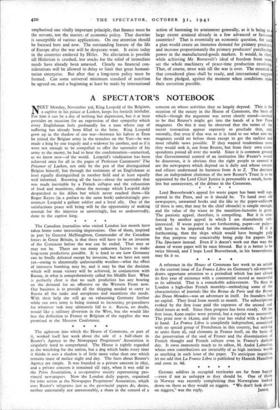The agitation into which the House of Commons, or part
of it, worked itself last week about the sale of a half-share in Reuter's Agency to the Newspaper Proprietors' Association is singularly hard to comprehend. The House is rightly regarded as the watchdog for the nation, but a dog which barks every time it thinks it sees a shadow is of little more value than one which remains mute of malice night and day. The facts about Reuter's Agency are simple. It was founded as a private concern in x851, and a private concern it remained till x925, when it was sold to the Press Association, a co-operative society representing pro- vincial newspapers. Now the London daily papers, organised for joint action as the Newspaper Proprietors' Association, which uses Reuter's telegrams just as the provincial papers do, desire, neither unnaturally nor unreasonably, a share in the control of a
concern on whose activities they so largely depend. This is the occasion of the outcry in the House of Commons, the basis of which—though the argument was never dearly stated—seemed to be that Reuter's might get into the hands of a few Press magnates. On this it may be observed that the terms of the recent transaction appear expressly to preclude that, and, secondly, that even if that was so it is hard to see what aim the magnates could set before them except to get the earliest and most reliable news possible. If they wanted tendentious news they would seek it, not from Reuter, but from their own corre- spondents posted all over the world. Since it is common ground that Governmental control of an institution like Renter's would be disastrous, it is obvious that the right people to control it are the newspapers which depend on it daily and whose owners and editors understand its business from A to Z. The decision that an independent schairman of the new Reuter's Trust is to be appointed by the Lord Chief Justice is presumably a result, harm-
less but unnecessary, of the debate in the Commons. *. * *






















 Previous page
Previous page